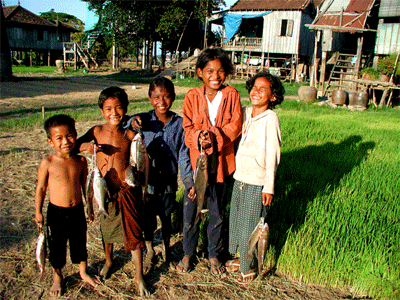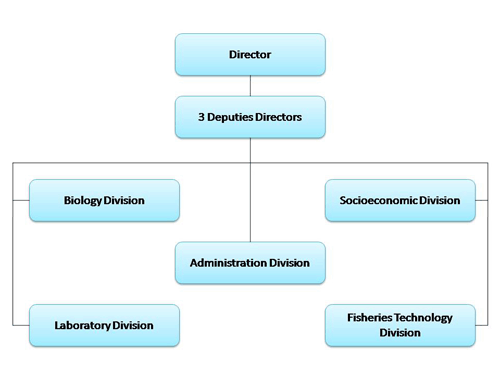Background
The Inland Fisheries Research and Development Institute (IFReDI) was established in October 2002 by virtue of Declaration No. 357 of the Ministry of Agriculture, Forestry and Fisheries (MAFF) as a Cambodia national research and development institute under the supervision of the Fisheries Administration of MAFF.
Vision

Sustainable development of Cambodia's inland aquatic resources for the country's food security, and economic prosperity.
Mission
To provide scientific information and technical support for the sustainable development and management of inland living aquatic resources in Cambodia, based on biological and socioeconomic research.
Goals
- Scientific collection, analysis and dissemination of biological and socioeconomic data;
- Development and upgrading of national capacity for the rational management of inland fisheries;
- Maximization of the income of fishermen and farmers;
- Sustainable utilization of the fishery resources.
Key Roles
- Monitor status and trends of fisheries and aquatic resources, and identify aquatic fauna and flora for supporting conservation, management and development of the fisheries and aquaculture sub-sector;
- Conduct fisheries ecology, biology and socio-economic, and aquaculture technology research;
- Study effectiveness and impact of flooded forests on fisheries resources;
- Study effectiveness and impact of inland fishing gears on fisheries resources;
- Study impact of water development on fisheries resources;
- Research to ecological friendly develop appropriate fishing technologies;
- Monitor, survey and control aquatic animal diseases and fisheries ecology;
- Develop and manage fish breeders for domestication breeding;
- Research and produce good genetic quality seed of aquatic animals for aquaculture development;
- Develop spawning, hatching and nursing technologies for aquatic animals, including fishes;
- Develop pond, cage and rice-cum-fish aquaculture technologies for commercially high value fishes;
- Study impact of carnivorous fish species on aquatic resources;
- Research and develop live feed and artificial feed production technologies for enhancing aquaculture development;
- Research into water quality, feed nutrition, fish diseases, and disease diagnosis and treatment/prevention;
- Provide on-the-job and educational/academic trainings on fish breeding, hatching, nursing and growth-out technologies to fisheries extension officers and farmers
- Publish and disseminate data and information on inland fishing and aquaculture technologies, fish ecology, fish biology and socioeconomics of inland fisheries; and
- Implement other necessary tasks required by the FiA management.
Organization

